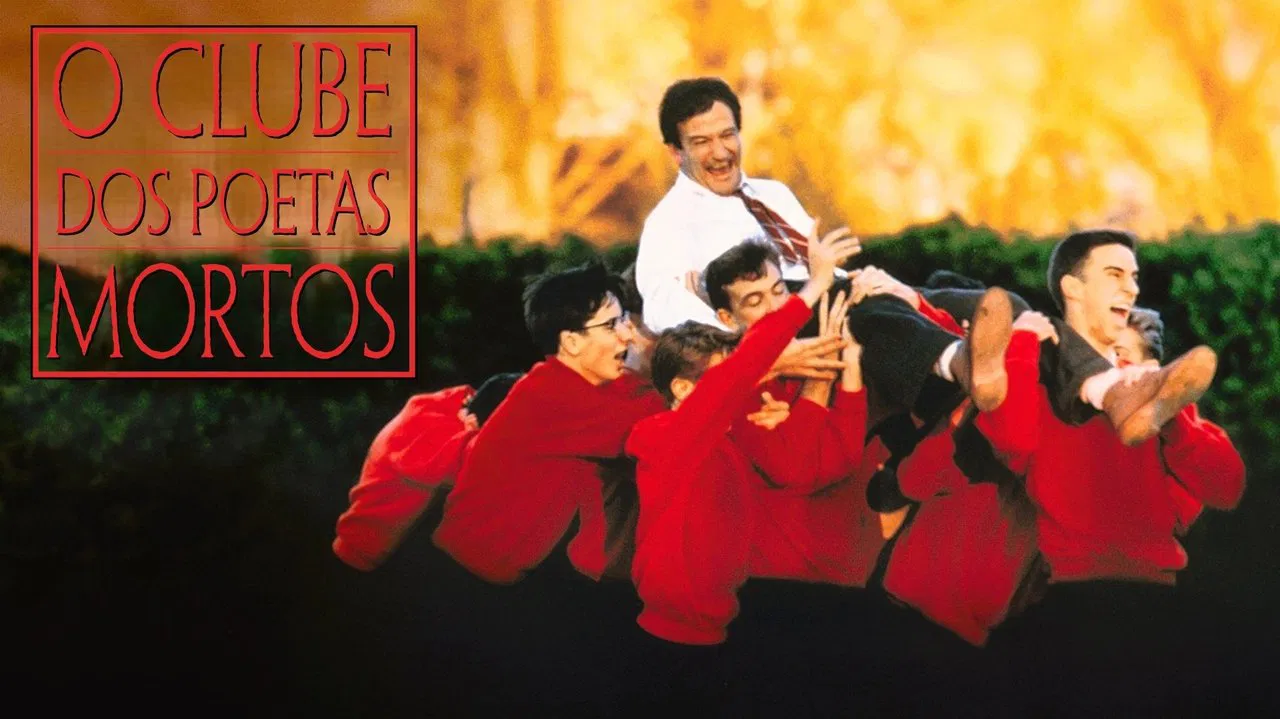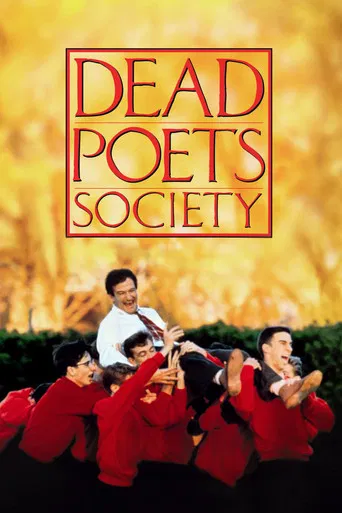

This movie is package of perfection. Everything is perfect. Direction level is damn too high. Cast did their job superbly especially Robin Williams. Background sound is too good. Editing is well enough. Best thing about this movie is that it consists of dream, emotion, love, success, passion and drama. You will get a unknown(?) feeling after watching this movie. You can not describe that feeling to anyone. Finally, one thing i can say "O Captain! My Captain!"
... View MoreDead Poets Society is absolute success in the portrayal of the truth of the individual, their individuality and the society that was formed on the back of it. The Western and every other First World Country is based in that idealism and through that achievement, pioneers and true champions have been born again and again. The thing about DPS that I do appreciate is also want deeply haunts me that despite it's idealism, very rarely does anything slip by the realists - very much like reality. That truth is so debilitating messed up that it is almost akin to the realization that according to the stats and surveys produced, no matter what you have chosen to believe, most of us would have ended up as the accomplice to the oppression in the Holocaust than be the Hero whose list would be topic of an Oscar winning Biopic. I don't care that you think I may have overstretched my analogy because it is very much the truth in both counts. But getting back to the story, the realism wins out in those moments when Robert Sean Leonard's character chooses quicker incumbency of the inevitable grasp of death than rather face the futility and frustration of living his parents' dreams. This is also a recurrence when Robin William's (RIP, you brilliant and magnificent legend; I have no idea what you thought in the last moments of your days but if I could, I would tell you that every breath that you ever took was completely worth it and you left the world a better world than when you came into it and it was no so because it was inevitable but because you chose to make it better for those whose lives were touched by yours. So, thank you in addendum to anybody who ever made your life better and brought a smile to you) Keating is fired and students are left helpless to do anything about it till the last when they defy their necessary conformity to the school. But even then, the movie ends out an melancholic breezy high which could only be managed by the ambiguity of shot being cut then and there with a final display of approval. That is what is impressive about this movie that there is a definite parallel established in the story because of the world that exists and the world that should exist. It is beautiful in an haunting re-imposition of reality and its dread that we must fight everyday. It will also be close to my heart because of: 1) How close I feel to Neil Perry (RSL) because I could identify with the frustration he fought and lost. It makes me want to face the rough hands I have had in my life a little bit harder. I want to live and be happy in the way of Keating, but should I fail and can't get back up, let this be my self-implicated obituary - I have loved living. I have had good times and I have cherished each one of those, so much so that you could say I sucked the 'marrow out of those bones' whenever and however I could. Unfortunately, I must have more bad shit happen that I couldn't fight or became too cowardly against. I would like to apologize for that, I didn't mean to hurt anybody anymore. Perhaps, most of all, myself was the top of the list. I may have hated quite a few people because my Idealism and weaknesses and loved a lot more because of how much love I felt I had to give and also, of my perpetual, ever-lingering loneliness. I don't know if I feel those anymore, I don't if I want or want to give forgiveness and lastly, if there is even a beyond. I sincerely hope not, one life is all we have and it should all we get; peace and unknowing in the everlasting is all that I seek anymore if I have chosen this path. Take care, be well and value life while you have it and can still make good on its promises, honestly. Only a dead man can tell you the truth of that. 2) It contradicts on almost every story in Indian Film Industry that has been made on this topic (it might be slightly poetic that I am obsessed that I am so obsessed with pain, living in The City of Joy; Then again, Pain is a binary of Joy - Each the more building itself where the other chooses frequent). Indian movies are more emotional, more optimistic and dramatic in their flair that people will actually make the choices that Perry couldn't and people like the Perry parents and the Headmaster will actually take a chance on him and forgive him. This movie shows another very possible side of that scenario and I can appreciate that. Overall, I still do prefer movies with hopeful portrayals because if there is one thing we need some more almost everyday, it is hope. The hope that the unlikely, harder choice which may lead to a positive outcome after toil should still be fought for no matter how hard it is; which, I honestly know, easier said than done but I really wanted Perry to fight one more day even if it was and not have gone quietly into night - Rage, Rage against the dying light (I am paraphrasing Dylan Thomas's poem about this subject which was dedicated to his father). You will watch it. You need just someone to tell you that you will be alright. I will be that person and it is gonna be okay and I think you will find a more fervent desire to live life better and better yet as an definitive individual after you have watched it. P.S. - Should be anybody be interested in checking out the more optimistic portrayals of the style of story DPS pursued, here are the names - Mohabbatein & 3 Idiots
... View MoreAlways love seeing this movie. It's sad yet inspiring.
... View MoreDead Poet's Society, directed by Peter Weir, investigates the lives of a group of male students who attend Welton Academy, a highly conservative, rigorous boarding school in Vermont. Their English poetry teacher, Mr. Keating, inspires them through his unconventional methods of teaching to reestablish a "Dead Poet's Society" at their school, in which they gather to recite poetry and "suck the marrow out of life". Some may argue that Dead Poet's Society's themes of depression and suicide make the movie too morbid for young viewers. Others, including notorious movie critic Roger Ebert, may insist that the overrated movie has a tired and predictable plot; of course the innovative, non-comforting teacher will change the lives of his students and be fired by the traditional, ancient headmaster. However, I insist that this movie's heartfelt message, exploration of common teenage experiences, and inspirationally crafted characters make this film one of my favorites. Moreover, the film's actors and relatability makes Dead Poet's Society one of the greatest coming of age movies ever made.The actors in Dead Poet's Society make this film exceptional. The perfectly cast Robin Williams, who takes the role of Mr. Keating, blends humor, inspiration and sentiment to gorgeously execute his character. When Mr. Keating brings up lines from Shakespeare, he quirkily performs impressions of other famous actors spouting lines, incorporating the lovable nature of Robin Williams into the character. However, in an instant, Williams can just as easily spout words full of hope and inspiration that bring tears to my eyes. His ability to evoke such a multitude of emotions in viewers makes the film incredible to watch. Robert Sean Leonard, who plays Neil Perry, one of the boys who yearns to pursue an acting career despite his father's plans for him to become a doctor, has an amazing performance in this film. His versatile acting, which includes portraying Puck from "A Midsummer Night's Dream" within the movie and exploring the darkness of depression and failure, suck the audience into the plot and his character's journey. These actors create an attachment from the audience, which in part makes the film successful.The relatable scenarios in Dead Poet's Society appeals to the viewers' sense of sentiment. Robin William's character, Mr. Keating, encourages his English students to savor every moment in life and put themselves in uncomfortable situations to help them discover their inner passions. He often asks his students to stand on desks to prove everything can be perceived from a different perspective and walk around while a beat plays to show how easily they tend to walk with the beat and, therefore, lay victim to conformity. As an audience member, I, along with many others, can relate to having an awe-inspiring teacher that taught beyond the classroom. Mr. Briguglio, my tenth grade English teacher, often recited Mr. Keating's favorite phrase, "Carpe Diem," or seize the day, when encouraging us to go out into the world and live with vitality and drive. While we explored literature, not only did we discuss the books' themes and characters, but we also asked ourselves philosophical questions and often went off on tangents exploring human tendencies and personal experiences. Mr. Briguglio created a safe classroom environment, similar to Mr. Keating's, where students could fearlessly open up about their passions or worries. My experiences allowed the messages in Dead Poet's Society to deeply resonate with me because I could relate to these boys as their teachers completely changed their interpretation of learning and outlook on the future. This made this film extremely enjoyable for me to watch.This movie is one of the best coming of age movies because its inspirational messages evokes hope and curiosity in its audience. Mr. Keating's frequent invigorating spiels that encourage us to chase our dreams serve as a beacon of hope and optimism for his audience members. I was personally left with chills, feeling invincible and and as if I had somehow joined the Dead Poet's Society myself, unlocking new ways of perceiving the world and encountering life. The blend of tragedy, struggle, humor, warmth, love, and invaluable wisdom that this film harbors truly makes it a movie worth your time.
... View More